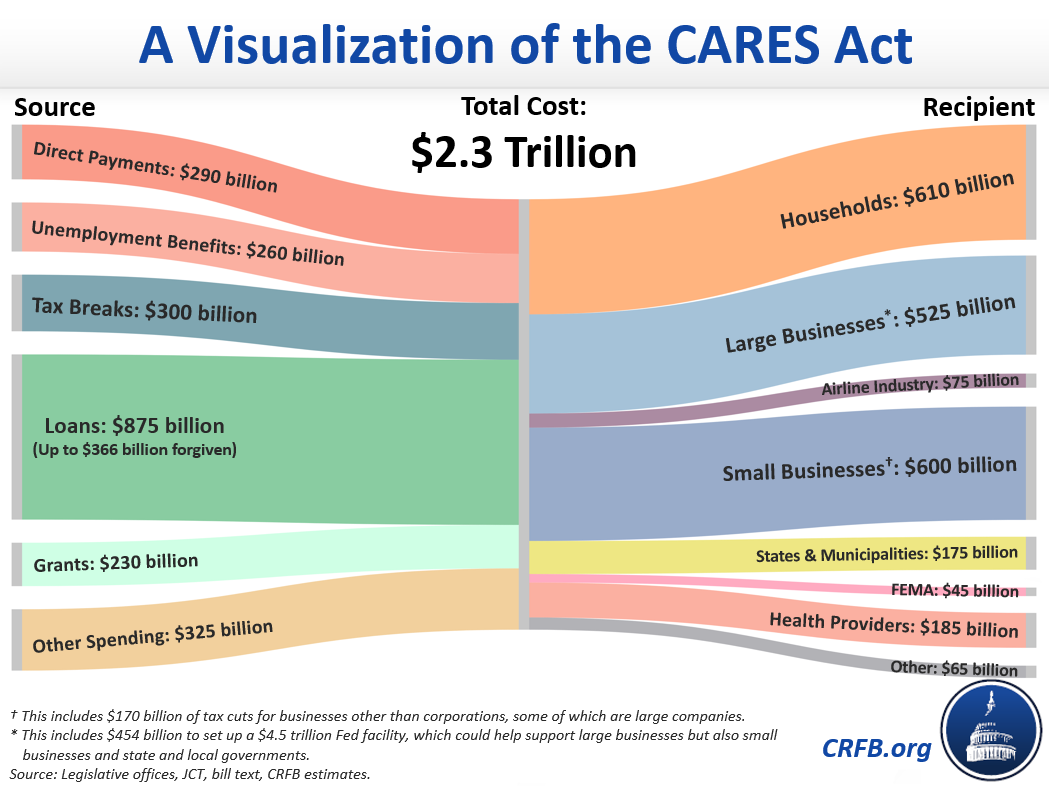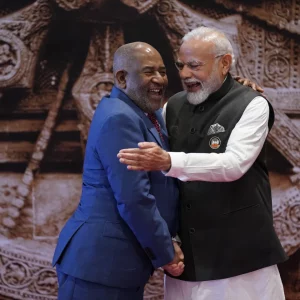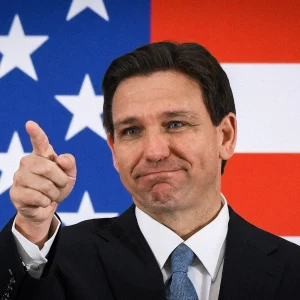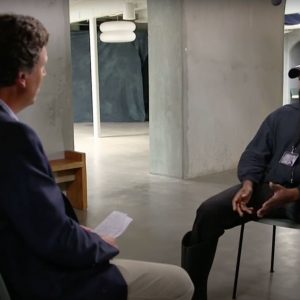Major crisis events have a way of transforming society. The Black Death, a bacterial plague that led to the deadliest pandemic in history during the 14th century, resulted in massive social upheaval. While the loss of life was horrid, the aftermath saw peasant laborers gain new rights and privileges in society and the decline of Europe’s hereditary nobility. More recently, the aftermath of the 1918 flu pandemic saw the implementation of universal healthcare systems first in the Soviet Union and then across Western Europe. It is not yet clear how the current COVID-19 crisis will re-shape America, but the government response so far can give us some clues.
Amidst the anxiety of uncertainty and social isolation, millions of Americans have received $1,200 payments directly from the federal government. The checks came as part of the $2 trillion economic relief bill called the CARES Act, which passed Congress unanimously and was signed into law by President Trump on March 27th. The unanimous bipartisan passage of this bill underscores the true level of crisis our country is in and the willingness of lawmakers to turn to unorthodox solutions.
The direct payments proposal was initially proposed by Representatives Ro Khanna (D-CA) and Tim Ryan (D-OH). It did not gain traction, however, until a tweet from Senator Mitt Romney (R-Utah) called for $1000 payments to every American adult in order to “help ensure families and workers can meet their short-term obligations and increase spending in the economy.” Others in the GOP quickly took up the idea. “These are not ordinary times…So [they] require extraordinary measures,” said Senate Majority Leader Mitch McConnell (R-Kentucky). While the payments are going by different names, including “stimulus checks,” “recovery rebates,” and “economic impact payments,” the policy feels strangely reminiscent of a long-debated policy idea: Universal Basic Income (UBI).
It feels as if the politically mainstream position on universal direct cash payments to Americans has flipped almost overnight. Andrew Yang’s wonky, meme-fueled presidential campaign focused on UBI, which he called the “Freedom Dividend.” His campaign gave the idea more traction than it had previously but was still met with skepticism by most other candidates and media pundits. “I certainly never imagined that I would suspend my campaign in February and then we would agree to pay $1,000 a month to Americans in March,” Yang said to Politico the week of Romney’s proposal. The CARES Act breathes new life into the old policy idea, which has been supported by figures as far back American founding father Thomas Paine.
To be clear, the direct payments in the CARES Act are not the same as a UBI policy. True UBI payments would be ongoing and universal. The CARES Act provided for one-time payments for people under a certain income level. Those who are over 16 and claimed as dependents by another taxpayer were not included (excluding the vast majority of college students). In addition, the process was fraught with technical issues in delivering the payments. However, it seems clear that the policy and its potential popularity with voters could signal a seismic shift in the political debate and potentially put true UBI front-and-center. Andrew Yang certainly thinks so.
“Universal basic income is going to be a big issue in 2020, and again in 2024 if it’s not passed before then,” says Yang. “I think that the fact is after Americans get this money…they’re going to like it.” Yang’s supporters are equally enthusiastic. “[The direct cash payments] will be one of the greatest spurs to Universal Basic Income in history,” read an email from UC Berkeley’s “Yang Gang” newsletter, a pro-UBI club affiliated with the now defunct campaign. The organization says that UBI “doesn’t make [people] lazy or a different person. It simply helps them pay the bills and have a better sense of the future.”
Support for UBI is not isolated to Yang’s movement, however. Major governments and leaders across the world are also on board. “This may be the time to consider a universal basic wage,” Pope Francis wrote in a letter to social movement leaders. The Pope continued by saying that a UBI policy would “achieve the ideal, at once so human and so Christian, of no worker without rights.” The Spanish government recently announced it will roll out its own cash handouts program, but unlike the US’s, this one will be permanent. While it will still be tied to income and therefore not universal, a major European nation announcing permanent cash transfers to citizens in response to the virus may be prophetic of the coming shift towards UBI-based models of government policy.
Many influential figures in America are less enthused about the idea of a shift to UBI. Major Democrats, including Speaker of the House Nancy Pelosi, were resistant even to the initial limited cash payments proposal. Economist Jason Furman, former deputy director of the National Economic Council under President Obama, was an early supporter of the emergency stimulus checks idea as a means of supporting the economy during the crisis. However, he told The Wall Street Journal he is “not a fan of UBI in normal times” because he doesn’t see a way to pay for it without raising taxes.
On Fox Business, David Bahnsen was even more critical, arguing direct payments won’t even stimulate the economy. “Giving money directly to people is the least stimulative” option, according to the television commentator and portfolio manager. If people need help, he says, “that’s what our unemployment system is for.” Bahnsen made this statement before Romney’s proposal, when direct payments had only been proposed by Democrats, and his viewpoint seems to be more representative of the Fox News far-right than leading conservative policy analysts. According to Oren Cass, a senior fellow at the conservative Manhattan Institute for Policy Research and an opponent of UBI, “sending checks out to people can have a stimulative effect” in a time of crisis. Cass clarified his and other conservatives’ viewpoint to the Wall Street Journal that “the fight [over UBI] is about whether having a permanent program to always send people money is a good way to operate society.”
While the COVID-19 pandemic is still in its early stages, the virus and its effects appear poised to influence structural changes in our economy and way of life in the years to come. Clearly, UBI has earned a place in this conversation. However, it is unclear how far the concept will go in the near future. The CARES Act provided for one-time payments, and the expected second round of payments has stalled amidst partisan gridlock. The payments also only accounted for a small portion of the $2 trillion spending bill. Most of the cost went to tax breaks and loans for businesses, not to mention the trillions more given to banks and other corporations by the Federal Reserve.

I reached out to David Kim, a pro-UBI congressional candidate endorsed by Andrew Yang’s Humanity Forward, to learn more about his vision for a UBI policy and how it is affected by the CARES Act. David is a lawyer and UC Berkeley alumnus who is running to unseat an incumbent Democrat in California’s 34th Congressional District in Los Angeles. Our exchange, conducted over email in late April, is below (edited for clarity):
Nikolai: How do you feel about the direct cash payments provision in the CARES Act and about the bill as a whole?
David: If we’re talking about the one-time $1200 stimulus check from the last stimulus package, although obviously necessary, it fell short of actually providing the economic relief that Americans need right now. If you’re telling the people that some of them can’t work anymore due to quarantine related reasons, with millions being laid off, work hours reduced, healthcare coverage being lost, unable to pay rent/mortgage for the month, you’d think it obvious for the local/state/federal governments to step in and say, “Hi, we hear you and feel your pain, and understand that you’re in so much financial distress right now as well due to this quarantine and we know that it’s impossible for you to financially live the next few months. So this is what we are going to do, for every single American, including undocumented workers:
- cancel/freeze your rent/mortgage
- enforce a real ban on evictions
- commandeer hotels/motels to house the unhoused
- give you a monthly emergency UBI payment of $2K to take care of basic expenses (for children under 18, the amount would be less)
- pass free Medicare for All
- expand and work towards allowing free COVID-19 testing for all
- implement contract tracing for all communities
Then allocate whatever money that’s left in the budget to corporations that need it. Not the other way around, like what was done in the $2+ trillion stimulus package where you pay out the corporations a huge chunk first. Congress is supposed to act like a government for the people first, not the corporations first. It’s this kind of people mentality and love for the people that is absent from our elected officials at every level. Even yesterday, the Los Angeles City Council voted to not expand the ban on evictions, and actually make it a real ban on evictions during these hard times, nor implement a rent freeze. Meanwhile, more than half of LA is suffering financially from loss of job or income. It’s ridiculous. And now on top of that, on the federal level, Mitch [McConnell] wants to pause giving relief to the American people right now because of concerns for debt? What the?! When the house is on fire, you don’t worry about how much water you need to save — you try to put the fire out with all the water that can help put it out.
Although I’m aware of various Reps’ bills and [different] versions of an emergency UBI, the interim package that the House is considering today doesn’t include direct cash payments, nor has it been confirmed that direct cash payments are being included in the next package.
Nikolai: What role did the UBI movement and the Yang campaign play in shaping the environment for this new policy?
David: Andrew Yang’s Presidential campaign played a huge rule in bringing UBI and the idea of direct cash payments to the national sceneby mobilizing and activating millions around the country and world. Many of us now are known to be as the fervent #YangGang around this radical, progressive idea of putting cash directly into the hands of the people …. to the point where every single person tuning into a Democratic Presidential Debate was learning about UBI because of Andrew Yang. And I believe all of this exposure to UBI for the first time is what planted the seeds and help set the stage for elected officials in DC, like Mitt Romney, to advocate for and pass some form of direct cash relief to certain Americans, even if a one-time $1200 check.
Nikolai: How will [The CARES Act] figure into the larger debate around UBI in the future? Does it make the implementation of a true UBI policy more likely?
David: This all brings us one step closer to implementing a permanent UBI — but before we get there, we really do need to implement an emergency UBI till the end of this quarantine/crisis. What this crisis shows is that although jobs with living wages are important, there are times where none of that may be available. What then? Will we, as a country and government, be prepared? Will we as a country acknowledge and understand that even in times where we don’t have a national public health crisis like COVID-19, we still have national emergency crises of poverty, homelessness and ever widening gaps of 30+ year income and wealth disparities, and jobs with living wages aren’t enough right now? Even post-Covid19, we will need both jobs with living wages and universal basic income to truly restore the economic power and welfare of all of our people again, along with other big actions of love as well (i.e., Medicare For All, etc..).
Nikolai: Why do you think dependents (which includes the vast majority of college students) are excluded completely from the bill (caretakers don’t get money for them either)? Would adult dependents, including those in college, be included in your UBI policy?
David: This article has a good explanation on why dependents weren’t included. As for my personal thoughts, any form of UBI that I would pass in Congress would definitely include dependents as you’ve referenced, undocumented workers and those who didn’t qualify to receive the $1200 check or who were otherwise excluded entirely.
Nikolai: Assess the threat of Republicans co-opting the energy of UBI using this policy. How can Democrats take ownership of UBI?
David: Nancy Pelosi needs to fight back. She’s stern with the Democrats but isn’t so much with the Republicans and doesn’t know how to play ball. Our leadership in DC really needs to change and put down its politics and get to the core, the heart of the people. Our government needs to return to one that truly loves the people, and one where its actions show that it truly loves and cares for the people. We’re not seeing that right now. In times like this, there shouldn’t be any play of politics. It’s sad to see. And that’s why it’s so important to vote for and elect people from our own communities into office, because once you become a career politician, you start to lose that real sense, connection and pulse of the community and the real, daily hustle and grind of making ends meet.
This November, we need to remember who all is in office right now, and vote them all out. The litmus test for any elected official is how much do you truly love the people and will sacrifice your life for the people, and not corporate interests or profits. For those reading, you are the revolution — you and we all just need to realize that, tap in, be empowered and take action. We are the revolution.
Featured Image Source: Forbes










Comments are closed.